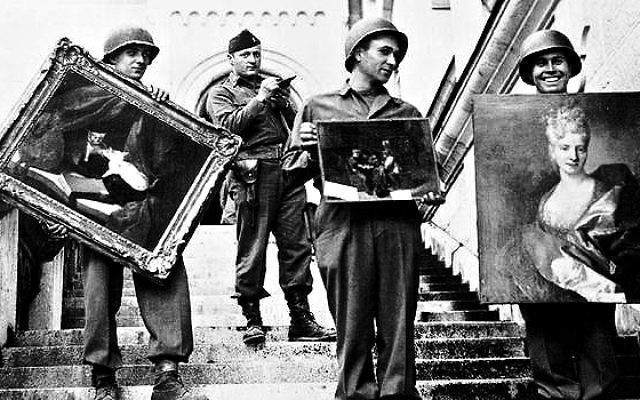Dutch government criticises own Shoah restitution policy
Report says Netherlands was an early leader in addressing the issue of stolen art, but 'its reputation in recent years has been damaged by a limited number of refusals'
In the Netherlands, proving that the Nazis stole artwork from your family isn’t always enough to claim it back.
Departing from norms across Europe, the kingdom’s policy is to weigh the interest of established heirs of looted art against those of the museums that hold them. In some cases the government has ruled in favour of museums, concluding that Jews should not get back the purloined art.
The Dutch policy has faced legal fights and international pressure. Now a government commission charged with evaluating the country’s record on the restitution of stolen art is adding to the criticism.
The commission, led by a former lawmaker named Jacob Kohnstamm, released its final report on Monday, a week before a ruling is expected in an Amsterdam court over a Dutch museum’s bid to keep a stolen Wassily Kandinsky valued at $22 million.
The 86-page report, titled “Striving toward Justice,” concludes that the Netherlands was an early leader in addressing the issue of stolen art, but “its reputation in recent years has been damaged by a limited number of refusals.”
It marks the first time that the Dutch government has openly criticised the Dutch Restitutions Committee, an advisory body whose establishment by the government in 2002 helped make Holland a pioneer in art restitution. The committee’s chairman resigned without explanation last week.
The Kandinsky refusal is by far the best known case. In 2013, the committee ruled that the Stedelijk Museum need not return his “Painting with Houses” even though it was stolen from the family of a Holocaust survivor named Irma Klein.
The committee cited “public interest” in keeping the work on display at the Stedelijk, among other arguments, and said nothing about offering Klein’s family restitution instead of the painting. The painting “has a significant place in the Stedelijk Museum’s collection,” the committee wrote.
The Süddeutsche Zeitung daily in Germany ridiculed the committee’s argument, summarising its conclusion to mean “Too pretty to give back.” The family has sued and a ruling is expected on Dec. 16.
Kohnstamm believes the court should rule against the museum.
“When you have a rightful owner, you have to offer restitution,” he told a Dutch newspaper this week.
The Kohnstamm report listed several additional problems with the Dutch restitution policy, including the failure to perform “structural provenance research” as required in the Washington Principles on Nazi-Confiscated Art – a landmark document agreed upon in 1998 by 44 countries, including the Netherlands.
The report said the restitution process is not transparent enough, “too formalistic” and experienced by claimants as “not sensitive enough” given their emotional involvement.
The Dutch Restitution Committee’s chairman since 2016, Alfred Hammerstein, resigned last week. He declined to say why he was stepping down.
Over the past 18 years, the Dutch Restitutions Committee has made 163 rulings on individual claims, fully approving 79 of them, or 48%. Another 19 claims were partially upheld and 39% were rejected.
The report said that claimants experience the committee’s work as “slow.”
In a statement, the Central Jewish Board of the Netherlands welcomed the Kohnstamm report, saying that its suggested approach is “simpler, more sensitive and just” than the one taken by the Dutch Restitution Committee.

Thank you for helping to make Jewish News the leading source of news and opinion for the UK Jewish community. Today we're asking for your invaluable help to continue putting our community first in everything we do.
For as little as £5 a month you can help sustain the vital work we do in celebrating and standing up for Jewish life in Britain.
Jewish News holds our community together and keeps us connected. Like a synagogue, it’s where people turn to feel part of something bigger. It also proudly shows the rest of Britain the vibrancy and rich culture of modern Jewish life.
You can make a quick and easy one-off or monthly contribution of £5, £10, £20 or any other sum you’re comfortable with.
100% of your donation will help us continue celebrating our community, in all its dynamic diversity...
Engaging
Being a community platform means so much more than producing a newspaper and website. One of our proudest roles is media partnering with our invaluable charities to amplify the outstanding work they do to help us all.
Celebrating
There’s no shortage of oys in the world but Jewish News takes every opportunity to celebrate the joys too, through projects like Night of Heroes, 40 Under 40 and other compelling countdowns that make the community kvell with pride.
Pioneering
In the first collaboration between media outlets from different faiths, Jewish News worked with British Muslim TV and Church Times to produce a list of young activists leading the way on interfaith understanding.
Campaigning
Royal Mail issued a stamp honouring Holocaust hero Sir Nicholas Winton after a Jewish News campaign attracted more than 100,000 backers. Jewish Newsalso produces special editions of the paper highlighting pressing issues including mental health and Holocaust remembrance.
Easy access
In an age when news is readily accessible, Jewish News provides high-quality content free online and offline, removing any financial barriers to connecting people.
Voice of our community to wider society
The Jewish News team regularly appears on TV, radio and on the pages of the national press to comment on stories about the Jewish community. Easy access to the paper on the streets of London also means Jewish News provides an invaluable window into the community for the country at large.
We hope you agree all this is worth preserving.






















